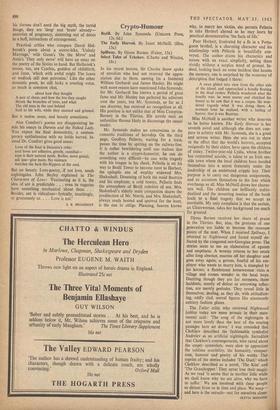Crypto-Humour
Spillway. By Djuna Barnes. (Faber, 15s.) Select Tales of Tchehov. (Chatto and Windus, I8s.)
IN his recent lecture, Sir Charles Snow spoke of novelists who had not received the appre- ciation due to them, naming (in a footnote) William Gerhardi and James Hanley. He might with more reason have mentioned John Symonds; for Mr. Gerhardi has known a period of great fame and Mr. Hanley has gathered his admirers over the years, but Mr. Symonds, so far as I can discover, has received no recognition at all. His position is not unlike that of Miss Compton- Burnett in the Thirties. His novels emit an unfamiliar flavour likely to discourage the casual reader.
Mr. Symonds makes no concessions to the romantic traditions of heroship. On the third page, Geoffrey Pellerin, waiting for a train, passes the time by spitting on the railway-line. It is rather bewildering until one realises that the author is a crypto-humorist; he can do something very difficult—he can write tragedy with his tongue in his cheek. Pellerin is on his way to Bezill Tower to become tutor to Herbert, the epileptic son of wealthy widowed Mrs. Shakeshaft. Dreaming of both the maid Beatrice and his employer, a cold beauty, Pellerin finds the atmosphere of Bezill redolent of sex. Mrs. Shakeshaft's elderly male companion shares the predilection of Mr. Norris, and Mrs. Shakeshaft, always ready booted and spurred for the hunt, is the one to oblige. Planning, heaven knows
why, to marry her victim, she permits Pellerin to take Herbert abroad so he may learn by practical demonstration 'the facts of life.'
Poor Herbert, frustrated by a fit in a Portu- guese brothel, is a charming character and his relationship with Pellerin is beautifully con- veyed. The author draws his characters and
scenes with an exact simplicity, setting them vividly without a surplus word of protest. In- deed, looking back on some incident that haunts the memory, one is surprised by the economy of
description that lodged it there: A swan glided into view from the other side of the island, and approached a bundle floating in the dead rushes. Pellerin wondered what the bundle was; he went nearer and clutched his breast as he saw that it was a corpse. He won-
dered vaguely what it was doing there. A moment later he realised, with a feeling of horror, that it was Beatrice.
Miss McNeill is another writer who deserves to be better known. The Early Harvest is her
seventh novel and although she does not com- pare in artistry with Mr. Symonds, she is a good and serious writer. Here she sets out to show us the effect that the world's horrors, accepted
resignedly by their elders, have upon the children of today. Twelve-year-old Lydia, whose brother
has committed suicide, is taken to an Irish sea- side town where the local children have banded themselves into a secret fraternity under the leadership of an embittered cripple boy. Their purpose is to carry out dangerous assignments, and so accustom themselves to the fear which
overhangs us all. Miss McNeill draws her charac-
ters well. The children are brilliantly indivi- dualised and the mounting tension of the book leads to a final tragedy that we accept as inevitable. My only complaint is that the author, an Ulsterwoman, takes her background too much for granted.
Djuna Barnes received her share of praise in the Thirties. But, alas, the geniuses of one
generation are liable to become the museum pieces of the next. When 1 received Spillway, I returned to Nightwood and found myself de-
feated by the congested neo-Georgian prose. The stories seem to me an elaboration of egoism and emptiness. A woman returns to her estate after long absence, marries off her daughter and goes away again; a groom, fearful of his em- ployer who wants to marry him, is trampled by his horses; a flamboyant horsewoman visits a village and rouses wonder in the local boys. Dazzling though they are for moments, these incidents, mostly of defeat or sorrowing reflec- tion, are merely preludes. They reveal little in themselves, dealing, as they do, with attitudinis- ing, oddly clad, unreal figures like nineteenth- century fashion plates.
The Taller critic who reviewed Nightwood (critics today are more prosaic in their state- ments) said: 'The song of the nightingale is not more lovely than the best of the soaring passages here set down.' I was reminded that Chekhov described the fashionable symbolist Andreiev as an artificial nightingale. Incredible that Chekhov's contemporaries, who raved about the empty symbolists, were slow to appreciate the sublime sensibility, the humanity, compas- sion, humour and poetry of his works. This reprint of the stories includes 'The Duel,' which Chekhov described as a novel, 'The Kiss' and 'The Grasshopper.' They never lose their magic. As we read 'it seems that in another little while we shall know why we are alive, why we have to suffer.' We are involved with these people so distant from us in time and place. We weep and here is the miracle—not for ourselves alone.
OLIVIA MANNINO






































 Previous page
Previous page